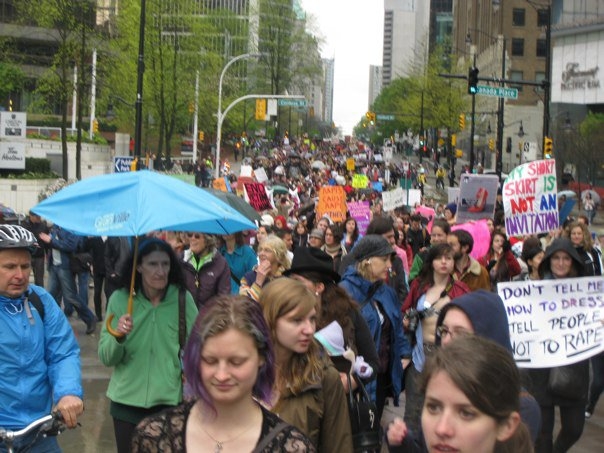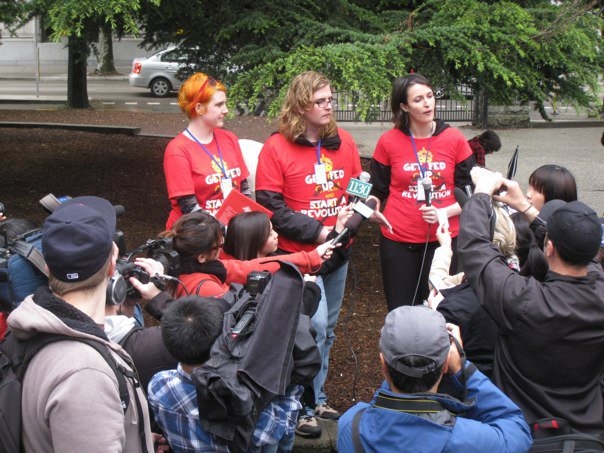This past Sunday, I participated in the local (to Vancouver) SlutWalk event. I have spoken previously about the issues that preceded this event, so if you haven’t heard of it you should probably read that post. I will attempt to summarize: a police officer in Toronto suggested that women who don’t want to get raped probably shouldn’t “dress like a slut”. Giving Constable Sanguinetti the benefit of the doubt for a moment, I’m sure what he was trying to say is that rapists are more likely to target women who are wearing clothes that expose skin than someone dressed in, say, business casual (more on this later). What followed was a backlash against the idea that rape victims are “asking for it” through their dress, as though a woman’s job is to not provoke the ravenous male hordes through improper dress.
Obviously, when put into context, this idea is not only wrong but very dangerous. Women are often blamed for being raped, disbelieved by even their own families and the judicial system. This kind of slut-shaming double standard inherently disadvantages women – “slut” is always a gendered term even when used (subversively) to describe men. Inherent in the word slut is the idea that a woman enjoying her sexuality is dirty and immoral. It is leveled against women irrespective of their level of sexual activity – a girl who sleeps with her boyfriend for the first time (or indeed, who has never done anything sexual) is just as likely to be called a slut by those around her as is a professional sex worker. Neither of them deserves the appellation – the word should never be used.
In this post, I will give some of my reactions to the event.
The Good
1. Attendance
I wasn’t sure how many people would bother to come to an event like this. Keep in mind that it was pouring rain at various points that day (this is Vancouver, after all), but there was a crowd of around 1,000 people (my estimate would have been higher, but that’s what the paper said) there. Some were dressed in a variety of costumes: three men in operatic drag, a woman in a Saran Wrap dress, a young woman in a really uncomfortable-looking corset, a guy wearing a tiny t-shirt and silver bicycle shorts (not a flattering look… they kept slipping down), and my personal favourite: bandana man – so named because that’s all that covered his junk. My response to my friend (who I will call “Julie” just for simplicity’s sake) was “wow, who knew people actually cared about women’s rights?”
2. Who Attended
One would expect that an event like this would be almost entirely women. I was pleasantly surprised at the gender mix: still majority women but with a lot of friends, spouses, boyfriends, and people like me who simply care about the issue there. It is a sad fact of the sexual double-standard that these kinds of issues only seem to gain real traction when men start speaking about them, but at least the Y chromosome camp was well-represented. It certainly surprised a couple of knuckle-draggers who showed up expecting a parade of sluts, and were instead confronted by a group of passionate feminist allies.
3. Support
This was not a fringe event where only a few whackos showed up (although there were a few of those, to be sure). In addition to various legal and social support organizations, the deputy mayor of Vancouver Ellen Woodworth showed up and spoke at the kickoff to the march (“As a lesbian, a queer, a dyke… I know the power that words have”). Media were present, and sponsors had donated materials and time to the event. The Vancouver Police were also on hand to block traffic, which was important because there were a lot of people on the streets.
4. The Reaction
Nothing was more rewarding than seeing people’s faces as the parade moved past. People were shocked to see not only the attire, but the word “SLUT” paraded defiantly and openly through the streets. I said to Julie “that is the face of consciousnesses being raised.”
The Bad
1. Messaging
One of the stated purposes of SlutWalk was to reclaim the word ‘slut’, in order to rob it of its power. Ultimately, I disagreed with this part of the campaign. Like with the word “nigger”, I don’t think that re-appropriating words is a useful endeavour. I am of the opinion that people should be forced to deal with the full history and implication of a word like ‘slut’, and to understand that it is a word that cannot be separated from inherent hatred of women. Once people understand not only where it comes from, but how it is used to silence, shame and victimize women, they won’t want to use it. I have never been the target of the word ‘slut’, and so it is not my place to say that women shouldn’t re-appropriate it; my criticism is of the idea of re-appropriating words in general.
2. Failing to understand the point
I spotted a number of signs saying things like “real men don’t rape” and “don’t tell me how to dress; tell men how not to rape” and “rapists cause rape, not women”. Even one of the organizers went up and said “women don’t need to be reminded not to dress slutty; men need to be reminded that they will go to jail!” While I understand the spirit behind the statement, I think it demonstrates a fundamental misunderstanding of rape and slut-shaming. Men that rape women do not do so because they want to get laid*. They certainly don’t do it because they “are rapists” any more than people commit crimes because they “are criminals”. Failing to understand this is committing a fundamental attribution error.
Rape is an issue of control and respect. Rape is the result of someone believing that their own wishes supercede the rights of another person, and that the victim deserves her/his treatment for whatever reason. Rape, like all violence against women, is the product of the idea that women do not have the right to sexual self-determination. The word ‘slut’ is a manifestation of that idea. It is the idea that needs to be fought, rather than focussing on “rapists” – as though that was a group in and of itself that must be identified and punished. A man who doesn’t rape because it’s illegal will rape as soon as he thinks he can get away with it. Better to make fewer men that think rape is acceptable.
3. Failing to address the fallacy
There was a particularly powerful moment during the introductory speeches, where one of the organizers said “I am a woman, a colleague, a friend, a girlfriend, and a person deserving of respect.” She then removed her pants, revealing a short sequined skirt, followed by the words “I am still a woman, a colleague, a friend, a girlfriend, and I am still a person deserving of respect.” It was a perfect demonstration of the fact that regardless of a person’s apparel, she/he should be treated as a self-determining individual whose body is her/his own. However, as great as the demonstration was, it skipped over an important point.
While it is difficult to get exact numbers on this (since many sexual assaults go unreported, particularly in places where they are not taken seriously), I hope those of you who are skeptically-minded will allow me to get away with the following assertion: places that have strict dress codes for women do not have lower rates of sexual assault. While it is my suspicion that these places have higher rates of assault, at least we can conclusively state that covering women head to toe does not eliminate the risk of sexual victimization. The fallacy committed by Constable Sanguinetti was not that he was impolitic in his wording, it’s that the original statement is nonsense. The way that women dress is not related to their risk of being raped, at least at a population level.
I am reminded of the old joke about the two hikers that run afoul of a bear. While the first hiker starts running, the second quickly starts putting on his running shoes. “You fool!” calls the first hiker “Those shoes aren’t enough to outrun a bear!” The second hiker says “I don’t have to outrun the bear, I only have to outrun you.” There is no standard definition or quantitative parameters for what “dressing like a slut” means. It is entirely subjective – the things that are worn by the women I work with would be considered pornographic in many Middle-Eastern countries. The problem is not the clothes; it’s our attitudes towards women and sexuality.
This point was not adequately addressed by the speakers, and I think it was a real missed opportunity.
The Ugly
1. The Racial Double-Standard
Vancouver is a city with a large East- and South-Asian population. Black women and aboriginal women are disproportionately more likely to be victims of sexual assault (including rape) than are white women. Neither of these facts would have been apparent while looking at the crowd. Like most feminist and social activist causes in North America, SlutWalk Vancouver was attended by white people, organized by white people, and focused on issues that do not include race. One of the speakers was Angela, a woman who works front-line for a victim support service in Vancouver’s downtown East Side (DTES). She began talking about the work that she and her colleagues did while dealing with assault victims, and whenever she talked about defending women from rapists, her every sentence was greeted with enthusiastic applause and cheering.
When Angela pivoted to point out that there is a racial component of the word “slut” that is largely ignored, that women of colour don’t particularly want to take back the word “slut”, that this wasn’t an issue of wearing a little black dress but of not being beaten and subsequently ignored by the legal system, the reaction was far more muted. I think I might have been the only person who cheered.
There is a common theme in the intersection between race and feminism. Feminism is well-tended by white women, and many women of colour recognize that there is a need for shared mutual struggle. However, when issues of race and racism – particularly the fact that PoC are disproportionately affected by sexism – come up, there is significant hesitation to face those head-on. Aura Blogando calls this ‘white supremacy’ – I think that characterization is perhaps a bit strong. I think of it more in terms of “white blindness”, or more familiarily, privilege. White women are very enthusiastic to address those issues that are germane to themselves, but more reluctant (it seems) to bring issues affecting PoCs to the fore except in very tokenistic ways (for example, the organizers of SWV noted correctly that Vancouver is built on unceded Saalish territory, but didn’t say word one about the fact that Aboriginal women are more often the victims of assault).
By completely dismissing, or at least not making a point of raising, the issues associated with race, SlutWalk Vancouver allowed white people to feel good about themselves for standing up to one injustice, without having to deal with the related injustice in which their own (unexplored) attitudes play a role. This criticism should not be interpreted as an indemnification of white people, merely an observation that these issues tend not to become publicly-relevant until they affect the majority (in much the same way as sexism issues don’t get treated seriously until men complain about it too).
So in all of it, the good bad and ugly, I think SlutWalk Vancouver was a success. People from many different walks of life were present to raise consciousness about an issue that I think is very important, and hopefully a conversation will be sparked about not only the word “slut”, but how we think of women in our society in general. I was proud to participate, and look forward to more opportunities to do the same.
Like this article? Follow me on Twitter!
* I will no doubt be criticized for making the generalization that it is only men that rape women, or that only women are raped. I fully recognize that men rape men, and less frequently women rape men or other women. Rapists are not exclusively male, and victims are not exclusively female. I also recognize that transpersons are caught in a tricky gender classification limbo, and are disproportionately more likely to be victims of sexual assault and rape than are cispersons. It is not my intention to diminish these cases, and I hope I do not come across as dismissive of this very real issue.





